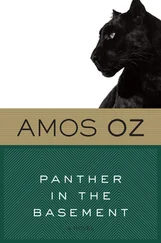Amos Oz - Where the Jackals Howl
Здесь есть возможность читать онлайн «Amos Oz - Where the Jackals Howl» весь текст электронной книги совершенно бесплатно (целиком полную версию без сокращений). В некоторых случаях можно слушать аудио, скачать через торрент в формате fb2 и присутствует краткое содержание. Год выпуска: 2012, Издательство: Houghton Mifflin Harcourt, Жанр: Современная проза, на английском языке. Описание произведения, (предисловие) а так же отзывы посетителей доступны на портале библиотеки ЛибКат.
- Название:Where the Jackals Howl
- Автор:
- Издательство:Houghton Mifflin Harcourt
- Жанр:
- Год:2012
- ISBN:нет данных
- Рейтинг книги:4 / 5. Голосов: 1
-
Избранное:Добавить в избранное
- Отзывы:
-
Ваша оценка:
- 80
- 1
- 2
- 3
- 4
- 5
Where the Jackals Howl: краткое содержание, описание и аннотация
Предлагаем к чтению аннотацию, описание, краткое содержание или предисловие (зависит от того, что написал сам автор книги «Where the Jackals Howl»). Если вы не нашли необходимую информацию о книге — напишите в комментариях, мы постараемся отыскать её.
Where the Jackals Howl — читать онлайн бесплатно полную книгу (весь текст) целиком
Ниже представлен текст книги, разбитый по страницам. Система сохранения места последней прочитанной страницы, позволяет с удобством читать онлайн бесплатно книгу «Where the Jackals Howl», без необходимости каждый раз заново искать на чём Вы остановились. Поставьте закладку, и сможете в любой момент перейти на страницу, на которой закончили чтение.
Интервал:
Закладка:
When the founders of the kibbutz moved into the first permanent buildings, Batya was among them. Zeiger volunteered to build her an aquarium in her new house. He did this out of gratitude. Zeiger was a thickset, potbellied, hirsute man. He was always joking, as if the purpose of life in general and his own life in particular was amusement. He had certain fixed witticisms, and his good humor did not desert him even when his wife did. He said to anyone who cared to listen: I am a mere proletarian, but Felix is going to be a commissar one day, when the revolution comes; I’d live with him myself, if only he’d have me.
He was a short, stocky man, who always smelled of garlic and tobacco. He moved heavily and clumsily like a bear, and there was an endearing lightheartedness about him — even when he was accidentally shot in the stomach during illegal weapon-practice in the old days. We were fond of him, especially at festivals, weddings, and parties, to which he made an indispensable contribution.
Ever since his wife left him, he had maintained a correspondence with a female relative, a divorcee herself, who lived in Philadelphia and whom he had never set eyes on. He used to call on Batya Pinski in the evenings, and she would translate the relative’s letters from English into Yiddish and his comical replies from Yiddish into English. Batya had taught herself English from the novels she read in bed at night. He always apologized at the end of each visit for taking up her valuable time; but it was he who dug the flower bed in front of her new house, and raked it and mulched it and brought her bulbs and seedlings. His distinctive smell lingered in the room. Little Ditza loved to ask him riddles; he never knew the answers, or if he did he pretended not to, and she always laughed at his amazement when she told him.
One day he came with aluminum frames, panes of glass, a folding ruler, a screwdriver, and a sticky, smelly substance which he referred to as kit but which Batya taught him to call putty.
“An aquarium,” he said, “for fish to swim in. It’s aesthetic. It’s soothing. And it doesn’t make a noise and it doesn’t make a mess.”
And he set to work.
Batya Pinski took to calling him Ali Baba. Willingly accepting this nickname, he responded by calling her “the Contessa from Odessa.”
It was perhaps because of this nickname that little Ditza began to address Zeiger as Pessah. Even though his real name was Fischel, we all came to call him Pessah, so that even in the kibbutz newsletter he was referred to as Pessah Zeiger.
Firmly but carefully he fitted the panes of glass into the soft bed of putty. At intervals he employed a tool that fascinated both Batya and Ditza: a diamond glass-cutter.
“How can we thank you for this beautiful present?” Batya asked when the aquarium was finished.
Zeiger pondered a moment or two, breathed out a gust of garlic and tobacco, winked to himself, and suddenly shrugged his shoulders and said, “Chort znayet,” which is to say, the Devil alone knows.
The fish were brought in a jar and put into the aquarium with a great deal of fuss. Ditza had invited all her friends to a “fish party,” which did not please Batya. That evening Zeiger brought, in addition to the letter from his relative in Philadelphia, a small flask of brandy.
“Won’t you offer me a drink?” he said.
Batya poured him a drink and translated the letter and his reply.
That evening we were celebrating the Allied victory. World War II was over, and the monster had been vanquished. We flew the Zionist and socialist flags from the top of the water tower. In the nearby British army camp there was a fireworks display, and in the small hours of the morning the soldiers came in army trucks to join in the singing and dancing. The girls of the kibbutz saw fit to consent for once to dance with the British soldiers, despite their smell of beer. The dining hall was decorated with slogans and with a large portrait of Josef Stalin in uniform. Felix delivered a passionate oration about the pure new world which was about to be built on the ruins of the defeated powers of darkness. He pledged to us all that we would never forget those who had sacrificed their lives in this struggle, here and on distant frontiers. Then he pinned the victory badge printed by the Workers’ Party onto Batya’s lapel, shook her hand, and kissed her. We rose to our feet, sang the Zionist anthem and the “Internationale,” and danced all night. At ten past three Zeiger seized Batya’s arm, dragged her almost forcibly out of the corner of the dining hall where she had been sitting silently all evening, and saw her to her room. His voice was hoarse and his white shirt was clinging to his back, because between dances he had taken it upon himself to act like a clown, as if this had been an old-fashioned Jewish wedding. When they got to Batya’s door Zeiger said:
“That’s it. You’ve had more than enough. And now, good night.” He turned to go.
But she ordered him to come inside and he obeyed her. She took off his sweaty shirt. When he asked if he could wash his face, she said neither yes nor no, but instead she switched on the light in the aquarium and turned off the overhead light. He began to apologize or to plead but she cut his stammering short by pressing him to her, sweaty, steaming, unwashed, and embarrassed, and conquered him in silence.
12
IN A small village run on sound principles there are no secrets, nor can there be any.
Just before six o’clock in the morning, the neighbors saw Zeiger emerge, subdued, from Batya Pinski’s door. By seven o’clock the news had already reached the sewing room. Some of us, including Felix and his wife, Zetka (who had previously been married to Zeiger), saw a positive aspect to this new development: after all, the whole situation had been unnatural and full of unnecessary tensions. Now everything would be much simpler. Martyrdoms, Mediterranean tragedies, emotional arabesques were irreconcilable with the principles according to which we guided our lives.
Even these people, however, could not accept what ensued with equanimity. Zeiger was the first, but he was not the last. Within a matter of weeks, news had spread of various peripheral characters’ finding their way to Batya Pinski’s room at night. She did not even turn up her nose at refugees, or at eccentrics like Matityahu Damkov. Her silent, noble melancholy had turned into something better left unnamed. And her face was becoming ugly.
Within a year or two even little Ditza was going around with soldiers and birds of passage. We were unable to devote our full attention to this unhappy episode, because the struggle to drive out the British was reaching its climax, and then regular Arab armies invaded the country; they reached the very gates of our kibbutz, and we repelled them almost barehanded. Finally all was calm again. Hordes of refugees poured in from all directions. Zeiger’s relative, a middle-aged woman, also came, as a tourist, and dragged him back to Philadelphia with her. We were all sorry to see him go, and there were some who never forgave him. Felix accepted a central party position and graced us with his presence only on weekends. As for Batya, her last embers died. Ditza ran away again and again to the pioneering camps and the newly emerging settlements in the desert; again and again she was brought back. Her mother took to her room. She announced that her condition would not permit her to work any more. We did not know what this condition was, but we decided not to ask too many questions. We left her alone. We were all relieved when Ditza finally married Martin Zlotkin, the son of the well-known banker. Batya accepted the marriage and the presents of expensive furniture from the young couple calmly. It was the fish that were now in the center of the picture. The electric kettle was always on the boil. It seemed as though it was all over for her, when the matter of Abrasha’s literary remains came up and it was decided to publish his collected essays along with his letters from Madrid. Just as Felix had promised at the victory celebrations: we would not forget our comrades who had sacrificed their lives. And Felix it was who, despite all his commitments, did not forget, and made the kibbutz-movement publishing house finally tackle the job. The widow waited day by day. The fish swam across the picture without blurring it. They were cold but alive, they were not subject to the law of gravity, since they could hover effortlessly in the water. Last night’s storm will bring Abramek Bart; but it’s two o’clock already, and he hasn’t come yet. A man like him will be able to understand the delicate matter of the dedication; he won’t make any difficulties.
Читать дальшеИнтервал:
Закладка:
Похожие книги на «Where the Jackals Howl»
Представляем Вашему вниманию похожие книги на «Where the Jackals Howl» списком для выбора. Мы отобрали схожую по названию и смыслу литературу в надежде предоставить читателям больше вариантов отыскать новые, интересные, ещё непрочитанные произведения.
Обсуждение, отзывы о книге «Where the Jackals Howl» и просто собственные мнения читателей. Оставьте ваши комментарии, напишите, что Вы думаете о произведении, его смысле или главных героях. Укажите что конкретно понравилось, а что нет, и почему Вы так считаете.












